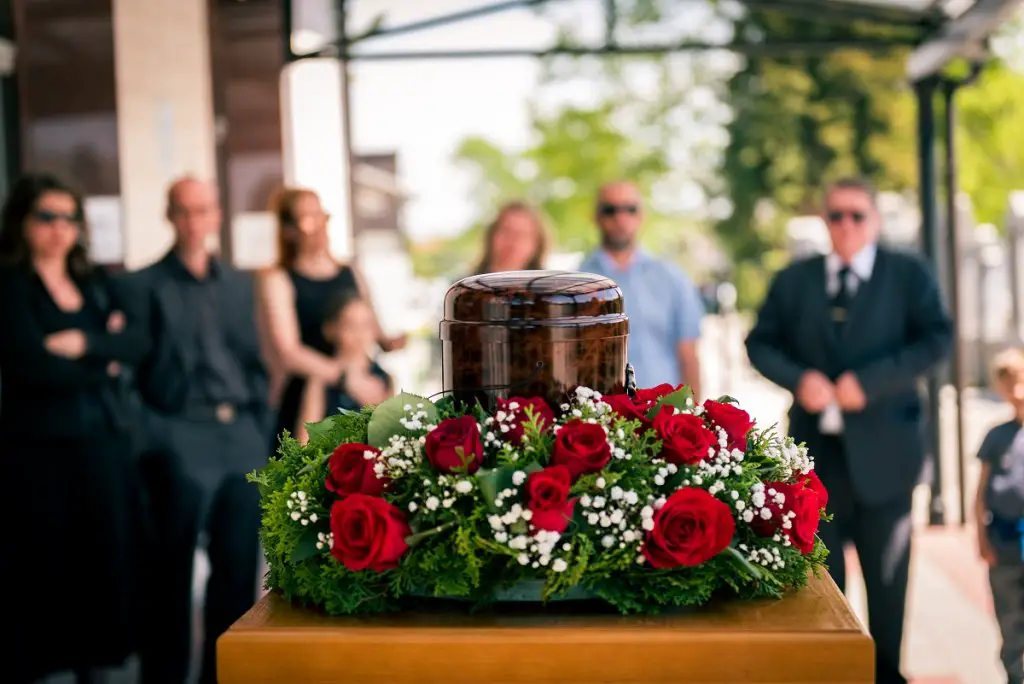Death immediately makes the deceased liable for the costs of their funeral, cremation, and burial. Planning ahead for how to pay for the cost of a funeral and burial can be challenging. Even paying with cash has its pitfalls, the fund may be tied up in probate court for several months.
Upon death, even the most frugal, debt-free person will create a new bill of thousands of dollars for their funeral services and burial. The frequently-quoted figures from the National Funeral Directors Association estimate the average cost for a traditional funeral burial at nearly $8,000 and almost $7,000 for cremation with a viewing.
The figures do not include burial costs such as a burial container, cemetery plot or space in a mausoleum or columbarium, cemetery fees, flowers, funeral receptions, and incidentals that can double the total funeral costs.
The costs for final arrangements also do not include the costs of out-of-pocket end-of-life expenses, which exceed $15,000 in most states.
How should a wise person plan to pay for their funeral and other final expenses so as not to put their family in debt?
Table of Contents
Ways To Pay For A Funeral
People who prepare for funeral costs typically choose one of these ways:
- Settling aside money in their will
- Accumulating money in a checking or savings account
- Term or whole life insurance policies which pay a lump sum when you die to a beneficiary you name
- Burial insurance (also known as funeral insurance) which pays death-related costs
- Government benefits such as Social Security pays a small death benefit while the Veteran’s Admistratration pays out a veteran’s benefit and offers free burial to those who qualify. FEMA (Federal Emergency Management Agency) pays those who die in natural disasters (including Covid), while victims of crime can have their funerals paid for through the Crime Victims Compensation Fund from their state. Medicare and Medicaid offer no death benefits or funeral assistance.
- Prepaid funeral plans, usually purchased from a funeral home, to cover a predetermined amount for a funeral
- Depending on the family, who may take out personal loans or use credit cards to make payment
- Crowdfunding, through Go Fund Me or other organized requests for money
Each of these payment methods has upsides and downsides.
Life insurance is a reliable payment method, although the interest rate paid is low on whole-life policies. Term insurance rises in price every few years, and if you discontinue the policy, you cannot redeem it for cash value.
Burial insurance is available in small amounts, without much underwriting. While the policy is easy to get, it is relatively costly per unit.
The Funeral Consumers Alliance (FCA), a death-care industry watchdog group, warns against buying pre-need and burial insurance, as the premiums may exceed what the policies will pay out. Pre-need policies with the funeral home are convenient, but they can be useless if the funeral home goes out of business or changes hands or if you move out of the area.
Expecting family or crowdfunding strangers to provide financial assistance is not what most responsible people want to resort to.
Either willing money to the funeral home or saving cash for your own funeral sounds ideal, but all property owned by the deceased at the time of death is subject to probate. Someone who plans their own funeral should discuss the best way to provide for it with their financial advisor or the estate lawyer who sets up their will.
In the video below, Funeral Fundamentals’ expert Jeff Lemley gives more details on how and when to pay for a funeral.
Probate And Cash Payments
Accumulating savings to pay for funeral expenses sounds like a smart idea, but unless the funds are held in an account accessible to another person, there could be a delay in making the payments.
When someone dies, any assets and liabilities left behind by the person are reviewed in probate court. This process aims to ensure that the deceased debts are paid and that assets are properly distributed. In most states, even a person with no assets and no family will have their estate go through probate to make sure that debts, final bills, and taxes are paid. The court also distributes the remaining assets to the person(s) specified in their will or to the next of kin.
The probate process starts when the county clerk receives a copy of the deceased person’s will and the death certificate. Failure to present a will to the county within the required time (i.e., 30 days) is a misdemeanor in most jurisdictions. The executor, named in the deceased’s will, or an administrator appointed by the court, will be the contact person for matters relating to the estate and a liaison with the family.
Any money owed by the estate will be paid out according to the following priority list that is similar in each state.
- Any and all expenses related to the estate administration
- Obligations secured by a mortgage, deed of trust, or another lien
- Funeral expenses
- Medical expenses related to last illness or death
- Family allowance (for family members who relied on the decedent for support)
- Wage claims (unpaid wages to any employees)
When an estate goes through probate, the executor must publish a notice in local newspapers, which gives creditors a certain amount of time to submit claims against the estate. The typical time is four to six months.
If the deceased’s estate was liquid, with plenty of money and no need to sell property to satisfy debts, the estate might be settled quickly. In any case, it takes at least four months to get the money released from probate.
During this time, the executor is under no obligation to use his own money to pay any debts. (If he or she does, they will later be reimbursed after providing receipts to the court. Only certain expenses will be repaid, so a savvy executor will make sure to know the rules before paying bills.)
Even though the funeral home is one of the higher priority expenses, there might still be a wait for them getting their money.
Will Funeral Homes Wait For Payment?
When someone, usually a family member, plans a funeral for a loved one, the funeral home presents the costs and discusses payment arrangements. The person who signs the contract for services is usually asked to be the personal guarantor of the debt in case the deceased does not have enough assets to cover the bill.
The funeral home may be willing to bill the estate. In some cases, if there is a valid will, the funeral home can get a direct transfer of funds from a bank account or insurance policy. However, the funeral director can request an advance or full payment from the family member setting up the funeral if he suspects there may not be enough money in the estate to pay him.
While the funeral home might need to wait four to six weeks to get an insurance payout, they might have to wait a minimum of four months for probate dispersals.
Can Cash Be Accessible After Death?
Certain bank accounts are set up to make funds payable on death (POD) to a named person the account owner specifies. The named person can present a death certificate to the bank and receive the funds without going through probate. A person who wants to pay cash for their funeral would be smart to set up a POD account or Totten trust to make money available after death.
The main risk involved with this setup is that the person who withdraws the money is under no obligation to use it for a specific purpose. Whereas the deceased planned for the money to be used for the funeral and other specific expenses, the beneficiary could go on vacation, pay their personal bills, or do whatever they wanted without scrutiny.
An alternative method to make money accessible is to set up a joint account where the living account holder has rights of survivorship after the death of the other person. Prior to the death of one account holder, both people have access to the account. If one is untrustworthy, they could fritter away the funds before the other person’s body was cold. This arrangement can help the surviving spouse pay for the funeral and other expenses.

Ways To Cut Costs
In many cases, if the deceased has cash, insurance, or a family willing to pay their final arrangements, the funeral home is willing to work with the family or the executor of the estate.
A responsible funeral planner will look for ways to keep the costs as low as possible. Maybe the insured or the family have available resources for a fancy casket and other expensive options when putting a loved one to rest. Most families, however, actively seek ways to keep expenses down.
How can this be done?
When the family goes to the funeral home, the enterprise is bound by law to disclose costs. Since the passage of the FTC Funeral Rule in 1984, funeral homes cannot claim that families must buy services they do not need. For example, they can’t say that the consumer must buy a casket for that or that they must buy a casket for any cremation. The funeral industry, however, is a business, and funeral directors offer upgrades on caskets and other services.
Grief-stricken consumers must be careful not to let their emotions do the thinking for them and lead them to choose products and services beyond their price range to supposedly show love and respect for the dead person.
Funeral homes will quote ballpark prices over the phone. Before booking a funeral home, a savvy funeral consumer will check prices on caskets, venues for the reception, and other services. There are plenty of online resources available that disclose average funeral costs in their area for traditional burials, natural burial, and cremations.
Traditional funerals, or even cremations with viewings, are costly because they involve many services on the part of the funeral home. Embalming, staff time, and opening the funeral home to visitors for the viewing add thousands to the final bill.

To minimize the cost of death and burial expenses, many families are looking to less expensive alternatives. Cremation can be particularly cost-effective if the family chooses direct cremation that requires no embalming or viewing. The most economical way to purchase direct cremation services is to deal directly with the crematory. Most funeral homes that use third-party providers offer direct cremation packages that are still thousands less than for traditional cremations with viewings.

Families who choose to scatter the cremains rather than burying them or displaying them in a columbarium save thousands more.

Natural or direct burial, which bypasses the costs of embalming, viewings at the funeral home, and a casket and burial liner, can also cut thousands from the final cost. Recent estimates indicate that the cost is about half that of traditional funerals.
Some families preserve the deceased’s body at home with dry ice so that friends can stop by for a final goodbye and bury it on private property. Funeral homes are sometimes involved in these funerals to provide transportation and application for death certificates.
In the case of either direct cremation or natural burial, the family can still hold a funeral or memorial service to honor the deceased and offer closure to the family.
For families paying for funeral services with insurance, cash, or funds designated in the will, minimizing funeral expenses can leave more money for the living. If costs come in under what the deceased budgeted for when pre-planning, the family can donate the extra to a favorite cause, plant a tree, or otherwise remember the deceased.

